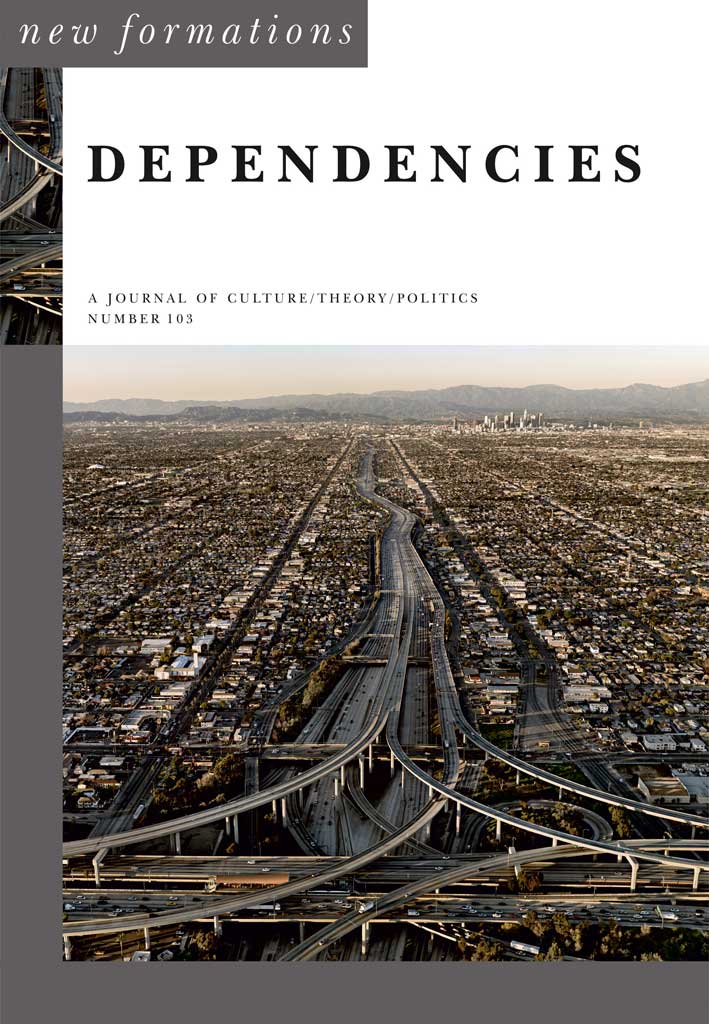
Liberalism’s Opiate Subjectivity: Dependency, Edinburgh and Enlightenment
New Formations - Print ISSN 0950-2378 - Online ISSN 1741-0789
Volume 2021 Number 103
Liberalism’s Opiate Subjectivity:
Dependency, Edinburgh and Enlightenment
Michael Gardiner pages 78‑93
DOI: 10.3898/NEWF:103.05.2021
Abstract
This essay suggests that British liberalism itself has an addictive core. It describes opiates as a particular carrier of this addiction, and follows them from the Edinburgh-based opium trade of the early nineteenth century to their rebound in the Edinburgh of the 1980s. Opiates are such a telling carrier of British liberal authority because they take on a dual historiographical and physical role, affirming both the rise of individual ownership and the understanding of that individual through an addictive self-interest. An accompaniment to and analogue for British globalisation, opiates show how entrepreneurship and dependency have been bound together. This essay describes how a hardening of Scottish Enlightenment ideas in the early nineteenth-century expansion of opium was echoed in the late twentieth century, as liberalism reformed for the post-industrial economy and Edinburgh reabsorbed the combined ‘dependency-entrepreneurship’. Both the 1830s opium that extended the reach of British liberal values and the 1980s heroin that accompanied post-industrial decline have their own heroic smuggling, virtuous entrepreneurialism and ‘property progressivism’. Both demand the reform of personal time in economic terms, first in a kind of Smithian productivity, second in a relentless search for opportunity against a background of mass unemployment. An opiate neoliberalism, moreover, becomes paradigmatic for the financialisation of personal relationships we experience in the twenty-first century, and the normalness of progressive pseudo-communities joined in individual self-interest. A number of dramas of the 1980s’ Edinburgh epidemic realise this, exposing the debilitation underside in virtuous progressive self-interest, and returning to the foundations of Scottish Enlightenment and British liberalism as a whole. Of these dramas, this essay returns to Shoot for the Sun (1986), Trainspotting (1993) and Looking After Jojo (1998), and asks what opiate entrepreneurialism says about our own ongoing ‘historiographical addiction’.
SORRY - you are not registered as being permitted online access to the full text of this article
You have the following options:
- If you are viewing this via an institution or academic library you can ask that your institution takes out a Subscription to this journal.
- If you already have a Personal Subscription please login below
Forgotten your username / password? Click here to locate
- Purchase an annual Personal Subscription
PRINT + DIGITAL personal subscription (£45 / year)
DIGITAL personal subscription (£30 / year)
A Personal Subscription provides immediate access not only to the single article you are seeking, but also to all past and future articles in this journal up to the expiry of your annual (calendar year) subscription. - Purchase immediate access to this single article (UK£7.00) - Buy article Coming Soon
To cite this article
Michael Gardiner (2021) Liberalism’s Opiate Subjectivity:
Dependency, Edinburgh and Enlightenment, New Formations, 2021(103), 78-93 . https://doi.org/10.3898/NEWF:103.05.2021
